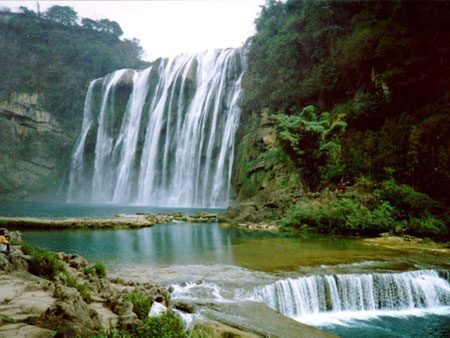Zunyi, the second-largest city of Guizhou province, is a land of revolutionary heroes and hometown to Maotai, the national white liquor.
It is among the country's 24 cities first approved by the State for their historic and cultural interest due to its "four ones" - one meeting, one mountain pass, one river and one liquor.
A 1935 meeting of the Communist Party of China in Zunyi was one of the decisive moments in history. Loushan Mountain Pass and Chishui River were sites of epic survival by the Red Army. Maotai earned honor of the No. 1 liquor for a country burdened with poverty and misery from war.
Today Zunyi is not only a center of comprehensive reform in the upper reaches of the Yangtze River, but also a green pearl on the Guizhou Plateau.
Over the years it has won awards such as a top-10 green city, a habitat and environment award, advanced city in sanitation, model city in gardening and a city famed for liquor culture.
During its long history the city has also produced famous figures including three scholars from the Qing Dynasty (1644-1911), Zheng Zhen, Mo Youzhi and Li Xuchang.

Thirty-meter Cave Waterfall in Zunyi. (File Photo)
Red Army Street
Red Army Street in downtown Zunyi is a focus for commerce, tourism, culture, recreation and restaurants. Its buildings are modeled on the style of local homes in northern Guizhou.
Phoenix Cultural Square
Phoenix Cultural Square in downtown Zunyi lies in the Phoenix national forest park, a natural oxygen source for the city. The park has more than 20 hills.
From the top of its highest peak at 1,058 m, a panorama of the city spreads out below. The Xiangjiang River winds through the city at the foot of the square.
Site of the Zunyi Meeting

Building that hosted the Zunyi Meeting is a national attraction.Zunyi, the second-largest city of Guizhou province, is a land of revolutionary heroes and hometown to Moutai, the national white liquor. (File Photo)
The Zunyi Meeting was held at No. 80, Red Flag Road in an old neighborhood. The building itself was the private residence of an army leader in the province and the best mansion in the city in the 1930s.
The central leadership of the Red Army held its famous Zunyi Meeting in January 1935, returning Mao Zedong to a core leadership role. The Red Army then changed its strategy and goals and marched to eventual victory. It was a pivotal time in the Party's history and Zunyi was afterward known as "the city with a favorable change of luck."
The Zunyi Meeting site today is a symbol of Party victory, the pride of Zunyi and a brand for tourism. It was among the first group of cultural sites listed under State protection, and is now a locale for education for youngsters.
Loushan Mountain Pass
Loushan Mountain Pass, 50 km to the south of downtown Zunyi, is where the 13th regiment of the Red Army led by Peng Dehuai came across the sixth regiment of the local Guizhou army on February 25, 1935. The Red Army dispersed its men, encircled its adversaries and gained its first major victory since the commencement of the Long March.
The site now has a monument and handscript carvings in stone of the poem Loushanguan written by Mao Zedong.
Three-Pavilion Park
The park, near Zunyi Normal College in Beichuan district, acquired its name from its ancient Wenchang, Chunyang and Guanyin pavilions. The original buildings are gone in the mists of history, current pavilions are built on their original sites.
(China Daily June 14,2008)